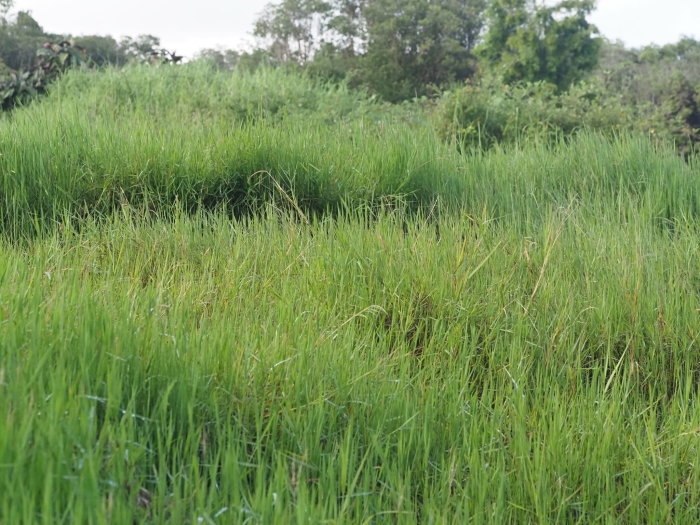Torpedo Grass
(Panicum repens)
Torpedo Grass (Panicum repens)
/
/

© Kevin Faccenda
CC BY 4.0
Image By:
© Kevin Faccenda
Recorded By:
Copyright:
CC BY 4.0
Copyright Notice:
Photo by: © Kevin Faccenda | License Type: CC BY 4.0 | License URL: http://creativecommons.org/licenses/by/4.0/ | Uploader: kevinfaccenda | Publisher: iNaturalist |

























Estimated Native Range
Summary
Panicum repens, commonly referred to as torpedo grass, creeping panic, or dog-tooth grass, is a perennial grass native to a variety of habitats including freshwater and brackish marshes, wetlands, riverbanks, and coastal dunes across Africa, Asia, Europe, and Australia. It is also found in the Mediterranean and Israel. This grass typically forms dense, spreading mats through its robust, branching rhizomes. It is highly adaptable to various soil types and moisture conditions, often thriving in disturbed areas.
Torpedo grass is notorious for its aggressive growth and invasiveness, particularly in wetland ecosystems where it can outcompete native vegetation and alter habitat structure. Due to its invasive nature, it is not recommended for ornamental use and is often subject to control measures. In cultivation, it requires minimal care, tolerating a range of soil conditions and water levels, from periodic flooding to dry spells. However, its potential to spread and become problematic should be carefully considered before planting.CC BY-SA 4.0
Torpedo grass is notorious for its aggressive growth and invasiveness, particularly in wetland ecosystems where it can outcompete native vegetation and alter habitat structure. Due to its invasive nature, it is not recommended for ornamental use and is often subject to control measures. In cultivation, it requires minimal care, tolerating a range of soil conditions and water levels, from periodic flooding to dry spells. However, its potential to spread and become problematic should be carefully considered before planting.CC BY-SA 4.0
Plant Description
- Plant Type: Grass
- Height: 1-3 feet
- Width: 1-3 feet
- Growth Rate: Moderate, Rapid
- Flower Color: N/A
- Flowering Season: Summer
- Leaf Retention: Semi-deciduous
Growth Requirements
- Sun: Full Sun
- Water: Medium
- Drainage: Fast, Medium, Slow
Common Uses
Erosion Control, Low Maintenance
Natural Habitat
Native to freshwater and brackish marshes, wetlands, riverbanks, and coastal dunes across Africa, Asia, Europe, and Australia, as well as the Mediterranean and Israel
Other Names
Common Names: Couch Panicum, Victoria Grass, Canota, Creeping Panic, Grama-Da-Praia, Grama-De-Ponta, Grama-Portuguesa
Scientific Names: , Panicum repens, Agrostis densiflora var. littorale, Panicum arenarium, Panicum chromatostigma, Panicum coloratum, Panicum convolutum, Panicum convolutum, Panicum grossarium, Panicum ischaemoides
GBIF Accepted Name: